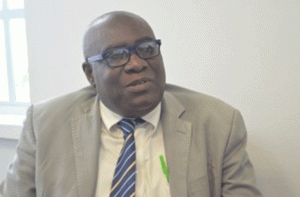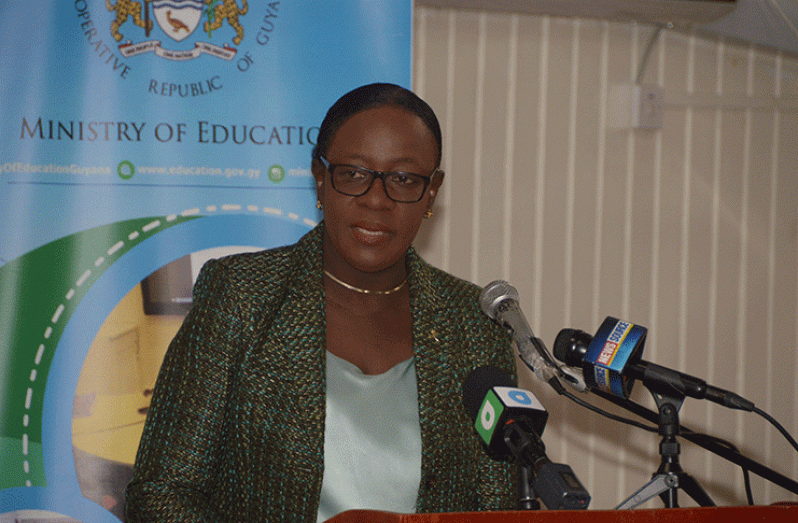– Says Chief Education Officer
CHIEF Education Officer (CEO), Dr. Marcel Hutson has said that there needs to be a “universal improvement” of pupils’ performances in the four subject areas taught at the primary level to ensure that quality education is provided.
Of the 14,300 pupils who sat the 2019 National Grade Six Assessment (NGSA), 42 per cent (or 6,006 pupils) obtained a score of 50 marks or more in Mathematics; in Science, the pass rate was 42 per cent (or 6,063 pupils); in English, it was 57 per cent (or 8,151 pupils) and Social Studies, 39 per cent (or 5,577 pupils).
With the announcement of the results of these examinations, Mathematics was recorded as the only subject which showed an increased number of children gaining 50 per cent or more when compared to the 2018 pass rates in all four subject areas.
The 2019 results illustrated that Mathematics redounded. This is attributed to the targeted interventions taken by the Ministry of Education (MoE) to improve performance in this subject.
In 2018, it was reported that 38 per cent of the 14,145 students who wrote the 2018 NGSA passed mathematics. This was below the 45 per cent passes recorded in 2017. In light of this, the MoE continued its ‘Maths camps’ where over 1000 children benefited since its introduction in 2018. Through these camps, Grade Six pupils were afforded the opportunity to attend extra mathematics classes from 09:00hrs to 12:00hrs on Saturdays at various schools.
These camps also followed the $48M the government injected into emergency intervention to strengthen the teaching capacity of mathematics at the Grade Six level in public schools in 2016– where the pass rate for Mathematics was pegged at a meagre 13.85 per cent.
“At the Ministry of Education, we’ve always been cognisant of the fact that we need to have programmes to improve the performances of our children,” the CEO said recently, noting that it was for this reason that those ‘Maths Camps’ were started.
Dr. Hutson explained that the camps helped to identify weaknesses children might have had in the subject and led to the creation of strategies that could target those weaknesses. This strategy of identifying weaknesses and subsequently working on those is one he shared that the MoE hopes to extend to the other subject areas.
“We have to be very careful because sometimes we look at the areas we are very weak in and sometimes we do so at the expense of other subject areas,” the CEO noted.
While there has been extra attention given to Mathematics, he said too, “What we want is that we want to see a universal improvement of all (subject) areas.”
According to one Grade Six teacher of an East Bank Demerara (EBD) public school, who did not wish to give her name, there has definitely been an increased focus on Mathematics and to a lesser extent, English.
“They (the MoE) have Maths Monitors that come to the schools to assess us when we’re teaching,” the teacher highlighted. “Naturally, as soon as we (the teachers) know the monitor is coming, we would try to focus more on maths to make sure everything is in order… we try to get all the materials, like the counters and so, in order,” she disclosed
 This teacher shared her belief that the extra focus on Mathematics is not a bad thing, since it is imperative in a technology-driven world. However, she noted that there still needs to be emphasis placed on the other subject areas.
This teacher shared her belief that the extra focus on Mathematics is not a bad thing, since it is imperative in a technology-driven world. However, she noted that there still needs to be emphasis placed on the other subject areas.
The Social Studies curriculum, for example, includes content on Guyana and nationhood, the cultural diversity in the country, the electoral systems and the Caribbean Community (CARICOM), inter alia.
The teacher further explained that these topics are all still very relevant to children and practical for their development as productive citizens. As such, the teacher said, “I think they should assess all subjects… just like how they monitor and assess Maths.”
Moving forward, the CEO related that the MoE was awaiting the item analysis for each subject from the Caribbean Examination Council (CXC), which is the body the Education Ministry has been collaborating with for the administration of the NGSA.
Once in possession of the analyses, Dr. Hutson highlighted that the MoE would be able to see what were the areas that the pupils did not do as well in and would subsequently craft strategies to target these.
However, the MoE has already begun ‘shifting gears’ in how education is delivered nationwide.
Speaking at the announcement of this year’s NGSA results, Minister of Education Dr. Nicolette Henry had shared that the education system will focus more on Science, Technology, Engineering and Mathematics (STEM) and Information and Communications Technology (ICT).
More specifically, she related that robotics, animation and artificial intelligence will be added to the primary schools’ curriculum.
“If we were to look at what’s happening in the whole global thrust of education, you would realise that ICT has become an important component in education delivery and it is difficult to deliver 21st century without ICT-enabled learning,” the Education Minister said. “We have to be rapid, we have to be where the cutting edge is and yes, we have to expose our students.”




.png)









